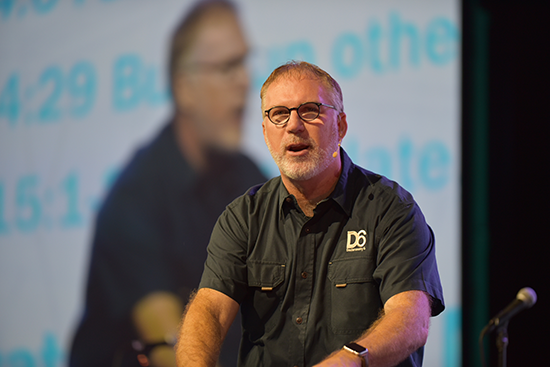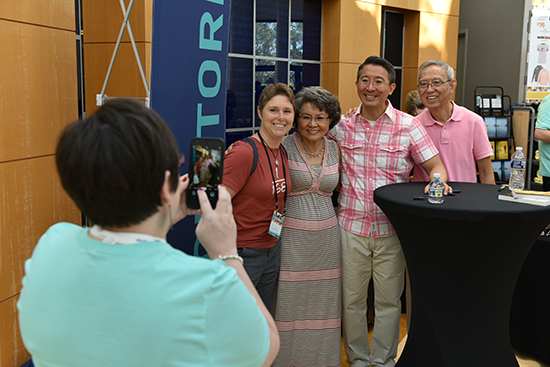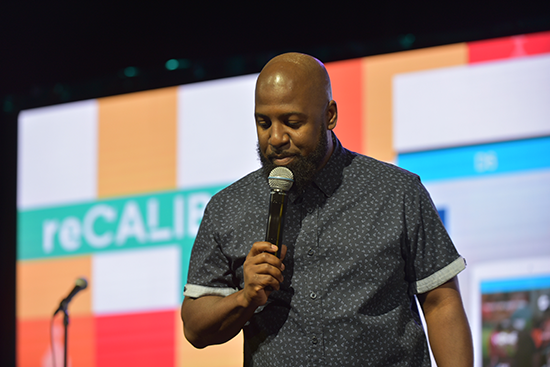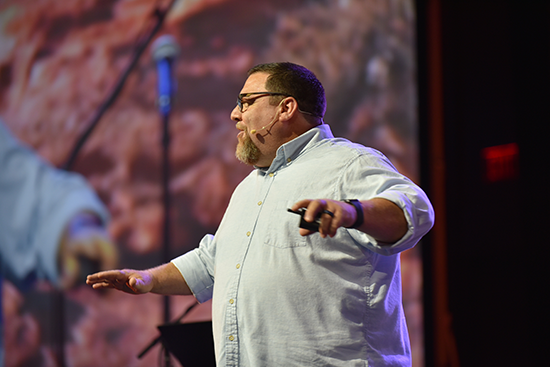
February-
March 2020
Eternal Investment
------------------
|





Recalibrate: The 2019 D6 Conference
By Eric K. Thomsen
I knelt by the stage at the D6 conference, armed with a brand-spanking new Nikon™ camera, ready to capture images of the fabulous line-up of speakers. As the first speaker walked onstage, I pulled the camera up and looked through the viewfinder. To my dismay, I discovered everything was out of focus. While moving equipment, I had unintentionally returned the camera to factory settings. White balance, focus settings, shutter speed, exposure, and depth of field—all the things I had worked so hard to perfect no longer worked. Ruefully, I returned quietly to the rear of the auditorium and pulled out my Nikon settings manual. It was time to recalibrate.
Throughout the conference, it dawned on me that I had experienced the perfect illustration of this year’s theme. Sometimes, in spite of hard work, good motives, passion for ministry, and a heart for discipleship, things just don’t work as expected, and church leaders and parents find themselves “out of focus.” With this in mind, attendees to the 2019 D6 Conference, September 26-28, in Orlando, Florida, were challenged to Recalibrate their ministry—to assess, correct, change, shift, and ultimately, advance into more effective discipleship.
In his welcome to attendees, conference director Ron Hunter reminded 1,345 listeners from 37 states and five countries that it was a moment of recalibration that provided the catalyst for the D6 Conference. In 2004, Randall House “dismantled” the traditional approach to Sunday School and created a line of family curriculum that put every age on the same page. In time, the innovative new approach to Sunday School expanded into the D6 conference, an event designed to bring church and family together, partnering to reach the next generation. Over three days, through 62 speakers and 77 intense sessions, conference attendees did just that.
Main Stage
Russell Moore, president of the Ethics and Religious Liberty Commission of the Southern Baptist Convention, kicked off main stage sessions by urging listeners to carve out family discipleship rooted in the Word of God, and more specifically, in the cross of Christ. He pointed to the crucifixion story recorded in John 19:16-36. Even as the lifeblood of Jesus likely fell on his mother’s face, the Savior affirmed and celebrated the family as he honored the law and His mother, making plans for her care.
His words identified family as more than just a biological relationship. When Jesus handed off Mary’s care to John, He relied upon a spiritual brother, a brother in the faith. This spiritual family relationship expanded in Acts 2, with the coming of the Holy Spirit. And today, family ministry starts by teaching families to relate to one another in the faith. Moore reminded listeners of two important truths. First, while family is important and significant, family does not come first; God is first. And, because God is first, we can pour out His love on our families, even when it hurts.
Perennial funnyman and student pastor Jon D. Forrest combined his unique humor with a serious message. Using the story of Mary and Martha, He challenged parents and church leaders not to fall into the “Martha trap,” doing good things but missing the best thing. Instead, Forrest urged them to follow Mary’s example of pouring out her best on the feet of Jesus. Why did Jesus let her do it? Because He is worthy! No sacrifice is an offering too good for the Savior.
Using Philippians 2:12-13, Philip Nation, vice-president and Bible publisher for the Thomas Nelson division of Harper Collins Publishing, identified habits as the “default settings” for our lives, including our spiritual lives. Sometimes, these habits can become destructive. In those moments, we must recalibrate, replacing destructive behaviors with four new habits of discipleship: 1) growth; 2) worship; 3) submission; and 4) mission. This is how we build, positive, helpful, Kingdom discipleship.
Tuesday morning, former missionary, author, and speaker Pam Tebow (perhaps better known as the mom of sports megastar Tim Tebow, “Timmy” to her), told listeners that Deuteronomy 6 changed ministry for her and her husband. She emphasized the profound impact God’s Word has to transform children into God’s image and challenged attendees to pass faith to the next generation by following two principles: 1) love them unconditionally as God loves us unconditionally; and 2) teach them to love God’s Word because you love God’s Word. Families and churches must remind children that no matter what they do in life, they can impact the world around them. Children are “arrows in the hands of the Lord,” Pam concluded, “Aim those arrows in the right direction and let them fly.”
Christopher Yuan, an author, professor, and acclaimed speaker, joined his parents, Leon and Angela, to offer a message of hope for a generation struggling with sexual identity. The trio shared their powerful testimony of how God brought them to Himself out of brokenness as a family and in spite of Christopher’s drug use, drug dealing, and openly homosexual lifestyle. The Yuans traced God’s hand of grace through Christopher’s arrest, incarceration, and eventual HIV diagnosis. Yet, only a few days after receiving the overwhelming diagnosis, Christopher first discovered Jeremiah 29:11, “For I know the plans I have for you...”
Christopher found the Lord in prison and began grappling with his addictions. While released from drug addiction quickly, his struggle with sexuality continued. He eventually found victory after acknowledging sexuality was not the core of his identity but Christ alone. He began a ministry in prison that continues today. “It’s the story of how God brought us all back together in Him,” Christopher concluded. He offered encouragement to parents with prodigals: “You are not the cure; you can’t change your child. You are not the cause, and it’s not your fault. You are not God. Your goal is not to produce godly children but to be godly parents.”
Dr. Ron Hunter Jr., the CEO of Randall House, and director of the D6 Conference, challenged listeners to recalibrate their mindset by turning challenging area of conversation into an effective bridge to discipleship. He offered a simple plan (T.A.L.K.) to start conversations with kids of any age: 1) Talk, or start the conversation; 2) Ask the right questions; 3) Listen carefully to answers; and 4) Give them Kudos for things they have done right.




Hunter followed with a second acronym (A.B.E.) to lead to meaningful conversation: consider the Approach to your conversation, connecting rather than correcting; remember the Brain, and teach them the why, not just the what. Finally, understand the Emotion that can easily drive the decisions children make. Relationships are built on meaningful conversation, he concluded, making it the foundation of our influence.
Evangelist, statistician, viral YouTuber, and podcaster Jefferson Bethke identified two ways the church is not preparing families for life—rhythm and story. He pointed to the biblical view of time, which promotes a rhythmic way of living, based on rest and fellowship with God before productivity. Creation itself sets the example he noted, starting with evening (rest), then morning (productivity). It continued on the seventh day, when God set aside a full day for rest and fellowship with Himself—Adam’s first, full day of life. Again, rest and fellowship with God before productivity.
Bethke shared the importance of identity and ritual in Judaism, centered around the daily family table. The result? A clear identity and 95% retention rate of children to Judaism. With this example in mind, Bethke urged leaders to equip families to center their homes around 1) the “discipleship table” through daily rituals and habits that shape faith through countless repetition; 2) weekly observance of Sabbath, not as a day to collapse but a day to pause, rejuvenate, and celebrate God and his faithfulness; 3) yearly celebrations and holidays that give families an opportunity to recall the story of what God has done in the life of their family. Over time, these identity-shaping rituals ground children in the faith, establish healthy rhythms of living, and prepare them to disciple their own children.
Kandi Gallaty, a Tennessee mom with two energetic sons, reminded listeners that if we live our lives well before our children, they will learn to live out their own faith well. She urged daily engagement with Scripture, journaling, and accountability with other believers as keys to growing in faith as parents. Referencing 2 Timothy 3:14-17, and the faith Timothy learned from his mother and grandmother, Kandi urged parents to invest their faith in their kids from an early age. “If we want our children to come to us with problems as they get older,” Kristi concluded, “we must invest in them early.”
D6 Minis
On Friday afternoon, four back-to-back speakers shared brief, single-themed messages designed for maximum impact.
Jim Wideman, family ministry pioneer, asked, “What if the church and the home had another partner?” He identified those partners as grandparents and noted churches offer a great deal of training for parents but rarely offer discipleship training for grandparents.
Lissy Rienow, a 20-year-old college student and oldest of seven children, urged attendees to follow the advice of Malachi 4:5-6 and turn the hearts of children toward parents through training, encouraging, and equipping young people for life at home. She shared the results of interviews with teens across the country, which revealed that teens desire deeper heart relationships with parents and more leadership in the areas of faith and discipleship.
Michayla White, executive director of the International Network of Children’s Ministry, debunked the popular negative caricatures of millennials. Instead, she described her millennial generation as hard-working young adults, many with young families. They hold high-paying jobs and soon will be the majority in the American workforce. Using feedback from recent surveys, Michayla explained millennials are people of faith who want their children to have a relationship with Jesus. However, only 29.6% read the Bible every day. They want their children to follow Jesus, but they don’t understand discipleship and have no idea how to do it at home. They value relationships, clear communication, and leadership that values personal connection. They crave a real and authentic community.
With these characteristics in mind, Michayla identified three factors that determine millennial commitment to church: 1) good first impressions; 2) ethos, or hospitality and inclusion; and 3) disclosure and discipleship relationships. “Millennial parents of faith will commit to a church that commits itself wholeheartedly to their children,” Michayla concluded. “And a church that regularly renews itself toward children will grab the hearts of millennials.”
Jim Putnam, cofounder and senior pastor of Real Life Ministries in Post Falls, Idaho, offered advice to help pastors and church leaders meet the discipleship needs of rising generations. He urged personal discipleship in small groups fueled by loving relationships and resulting in a congregation that becomes a spiritual family. These relationships flow from house to house, drawing families together in Christ. “How do we change kids,” he concluded? “We disciple their parents!”
Beyond the Main Stage
D6 always brings much more than training sessions and main-stage speakers. During breaks, attendees explored a record number of exhibits filled with important Christian resources. They renewed friendships, swapped ideas, and prayed together over shared ministry challenges. They enjoyed powerful worship led by the D6 Band, under the direction of Michigan Free Will Baptist worship leader
Don Myers.
Now-familiar conference emcees Tommy Swindol and Jeff Wallace kept the crowd engaged with high-energy banter, videos, and interviews with speakers and ministry leaders. Jon Forrest kept everyone on their toes with crowd breakers, games, and crazy prizes for the ride home. For a second year, comedian Jonnie W brought his razor-sharp wit and off-the-wall musical comedy for a truly unique humor experience.
This year, the D6 Conference also marked a milestone achievement—the release of a book on the conference theme. The book, aptly titled Recalibrate, shares ground-breaking ideas from 15 innovative family ministry leaders on subjects that will help churches reevaluate effectiveness.
As the memorable conference reached its conclusion, Tommy Swindol asked attendees to pause and ask God two questions: “God, what is one thing I need to change in my life or ministry?” and “What one area do I need to change to benefit my family?”
Recalibrate.
About the Writer: Eric K. Thomsen is managing editor of
ONE Magazine and worship leader at Bethel FWB Church near Ashland City, Tennessee.
|
|

